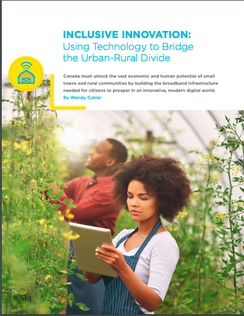|
|
Inclusive Innovation: Using Technology to Bridge the Urban-Rural DivideIf you're looking for a good overview of the issues in rural Canada regarding technology use, his report is a concise yet complete summary of many of the issues (and opportunities) that are present with technology in rural areas. This report is a must-read for those wanting to tap into the potential of rural Canada. The author's recommendations are attainable at a variety of levels and in a variety of situations. It is a positive document that showcases the opportunities in rural areas as part of the overall economic picture.
|
Considerations from the Report
- Reframe the urban/rural dichotomy to recognize the range along the continuum. Include a rural lens on policies related to innovation, economic development, international trade and direct foreign investment, ensuring broader range of sectors (e.g. agribusiness) are considered.
- Recognize that the high-speed networking requirements of business are significantly larger than those of consumers.
- Recognize that innovation is manifest differently in smaller communities than it is in large centres and may be incremental, focused on process improvement and new business models.
Recommendations
- Accelerate expansion of citizen access to high-speed networks to support drivers of economic development such as the development of digital skills and business, e-learning, e-health and telecommuting (e.g. Eastern Ontario Regional Network)
- Incentivize solutions that strengthen linkages between smaller communities and larger centres (e.g. allocation of spectrum that privileges smaller communities, outsourcing functions that can be done remotely, specialized training and services beyond call centres).
- Consider digital services investments to address affordability, similar to the Northern Ontario fuel tax credit.
- Focus on incentives - such as one-stop shopping, networks and concierge services that help small businesses navigate the resources that support them - in order to attract and grow businesses in rural communities.
Discussion Points
- What examples currently exist for rural communities fueling innovation, testing new solutions, driving economic development and attracting foreign investment?
- What is being done in the area of high-speed networks and what is the anticipated future technology?
- What are the barriers to strengthening linkages between smaller and larger communities?
- How are small communities promoting themselves to build partnerships and investment? Who is doing this well?
- How are communities addressing affordability of broadband connectivity? What is the distance (or is there a distance to create a viable market for providers?
- How can rural communities attract the opportunity to become test sites for innovation when they do have access to higher broadband speeds?
- What is the indirect benefit for the rural economy (knowledge transfer, training, financing, legal services, marketing strategy development)? How can this be measured?
What more can we learn?
Do you know of some good research, a great report or any other insights that can help round out this topic? Please add a link to any other information we may be missing so we can keep looking at this issue from all angles.
